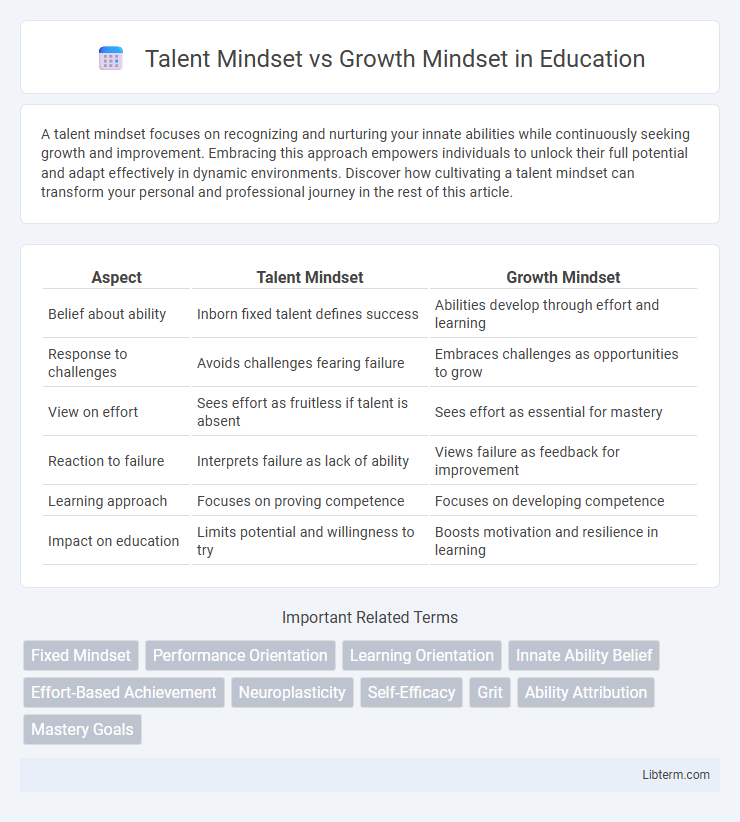A talent mindset focuses on recognizing and nurturing your innate abilities while continuously seeking growth and improvement. Embracing this approach empowers individuals to unlock their full potential and adapt effectively in dynamic environments. Discover how cultivating a talent mindset can transform your personal and professional journey in the rest of this article.
Table of Comparison
| Aspect | Talent Mindset | Growth Mindset |
|---|---|---|
| Belief about ability | Inborn fixed talent defines success | Abilities develop through effort and learning |
| Response to challenges | Avoids challenges fearing failure | Embraces challenges as opportunities to grow |
| View on effort | Sees effort as fruitless if talent is absent | Sees effort as essential for mastery |
| Reaction to failure | Interprets failure as lack of ability | Views failure as feedback for improvement |
| Learning approach | Focuses on proving competence | Focuses on developing competence |
| Impact on education | Limits potential and willingness to try | Boosts motivation and resilience in learning |
Understanding Talent Mindset: Core Principles
Talent Mindset centers on the belief that abilities and intelligence are innate and fixed traits, shaping how individuals approach challenges and learning opportunities. This perspective often leads to a preference for tasks that showcase existing skills rather than those that promote development or risk failure. Emphasizing natural aptitude over effort can limit motivation for growth and resilience in the face of setbacks.
Defining Growth Mindset: Foundational Concepts
Growth mindset centers on the belief that abilities and intelligence can be developed through effort, learning, and perseverance. This concept, pioneered by psychologist Carol Dweck, contrasts with a fixed mindset, which assumes talents are innate and unchangeable. Emphasizing growth mindset enables individuals to embrace challenges, learn from failures, and enhance skills continuously.
Key Differences Between Talent and Growth Mindsets
Talent mindset assumes that abilities are innate and fixed, leading individuals to avoid challenges and fear failure. Growth mindset embraces the belief that skills can be developed through effort and learning, promoting resilience and continuous improvement. This fundamental difference influences motivation, problem-solving approaches, and adaptability in personal and professional contexts.
Origins and Psychology Behind Both Mindsets
The Talent Mindset, rooted in fixed trait theory, posits that abilities are innate and unchangeable, often linked to early 20th-century psychological research on intelligence as a static measure. The Growth Mindset, popularized by psychologist Carol Dweck, is based on the premise that intelligence and skills can develop through effort, learning, and resilience, aligning with neuroplasticity and motivational psychology. Both mindsets influence motivation, learning behaviors, and achievement, with the Talent Mindset fostering a deterministic outlook, while the Growth Mindset encourages adaptability and continuous improvement.
Effects on Learning and Performance
Talent Mindset, which assumes fixed abilities, often limits learning potential by reducing motivation to face challenges and hindering persistence after failures. Growth Mindset, emphasizing effort and development, enhances learning outcomes by fostering resilience, adaptability, and continuous skill acquisition. Studies show individuals with a Growth Mindset consistently perform better and demonstrate higher achievement due to increased engagement and effective problem-solving strategies.
Talent Mindset in the Workplace
Talent Mindset in the workplace emphasizes inherent abilities and fixed skills, often leading employees to avoid challenges that might expose perceived limitations. This mindset can hinder creativity and innovation by limiting risk-taking and reducing motivation for continuous learning. Organizations that foster a Talent Mindset may face stagnation as employees focus more on proving talent than developing new competencies.
Growth Mindset and Personal Development
A growth mindset emphasizes continuous learning, embracing challenges, and viewing failures as opportunities for personal development. Individuals with a growth mindset engage in productive habits such as goal-setting, self-reflection, and seeking feedback to enhance their skills and resilience. Research from Stanford University highlights that cultivating a growth mindset significantly improves motivation and academic performance over fixed talent beliefs.
Overcoming Limitations: Shifting from Talent to Growth
Overcoming limitations requires shifting focus from innate talent to a growth mindset, emphasizing effort, learning, and adaptability over fixed abilities. Individuals embracing a growth mindset view challenges as opportunities to develop skills, which leads to increased resilience and sustained personal progress. This shift fosters continuous improvement by prioritizing practice and feedback rather than relying solely on natural talent.
Nurturing a Growth Mindset Culture
Nurturing a growth mindset culture emphasizes continuous learning, resilience, and embracing challenges as opportunities for development, contrasting with a fixed talent mindset that assumes abilities are innate and static. Organizations fostering growth mindsets encourage experimentation, constructive feedback, and skill enhancement, leading to increased innovation and employee engagement. Implementing coaching programs and recognition systems aligned with growth principles cultivates a thriving environment where talent evolves through effort and adaptability.
Choosing the Right Mindset for Success
Choosing the right mindset for success involves understanding that a growth mindset, which embraces learning and resilience, is more beneficial than a fixed talent mindset that assumes abilities are innate and unchangeable. Emphasizing continuous improvement, a growth mindset fosters adaptability, motivation, and long-term achievement by valuing effort over innate talent. Successful individuals and organizations prioritize developing a growth mindset to unlock potential and overcome challenges effectively.
Talent Mindset Infographic

 libterm.com
libterm.com